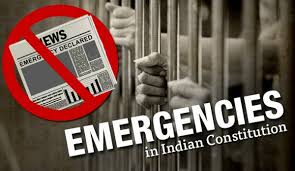EMERGENCY PROVISIONS AND THE CONSTITUTION OF INDIA; A CRITICAL ANALYSIS OF PART EIGHTEEN
Authors – HARIHARAN R*, Dr. K. SELVAKUMAR** & PAZHAMALAI S***
* Research Scholar(PT), PMIST (Deemed University), Thanjavur & Guest Lecturer, Government Law College, Tiruchirappalli
**. Director, KKCPS, PMIST (Deemed University), Thanjavur
***. Tutor at RACE Institute, Chidambaram
Best Citation – HARIHARAN R, Dr. K. SELVAKUMAR & PAZHAMALAI S, EMERGENCY PROVISIONS AND THE CONSTITUTION OF INDIA; A CRITICAL ANALYSIS OF PART EIGHTEEN, ILE JOURNAL OF GOVERNANCE AND POLICY REVIEW, 1 (1) of 2023, Pg. 74-87, ISSN – 2583 – 8032
ABSTRACT
As the name “emergency” implies, it refers to an unexpected turn of circumstances that forces public authorities to take immediate action within their jurisdiction. During an emergency, human civil rights are stripped from the state or nation, with the exception of Articles 20 and 21 of the Indian Constitution. The majority of emergencies are caused by malfunctioning administrative structure. The Indian federal system, according to Dr. B.R. Ambedkar, is unique in that it can become unified when administrative machinery fails.
The main goal of emergency legislative measures was to protect the region from tyranny, domestic upheaval, wars, and foreign attacks. Any emergency, according to the Black Law Dictionary, necessitates rapid involvement and warning since it poses harm to both people and liberty in the territory. Thus the research work is the attempt to throw light on the provision of emergency in India. The researcher also emphasis on the origin and historical context and explain different types of emergency in a precise manner and explaining the effect of the proclamation of emergency following with the conclusion.
Keywords: Emergency, State, Financial, National, Country, India.
